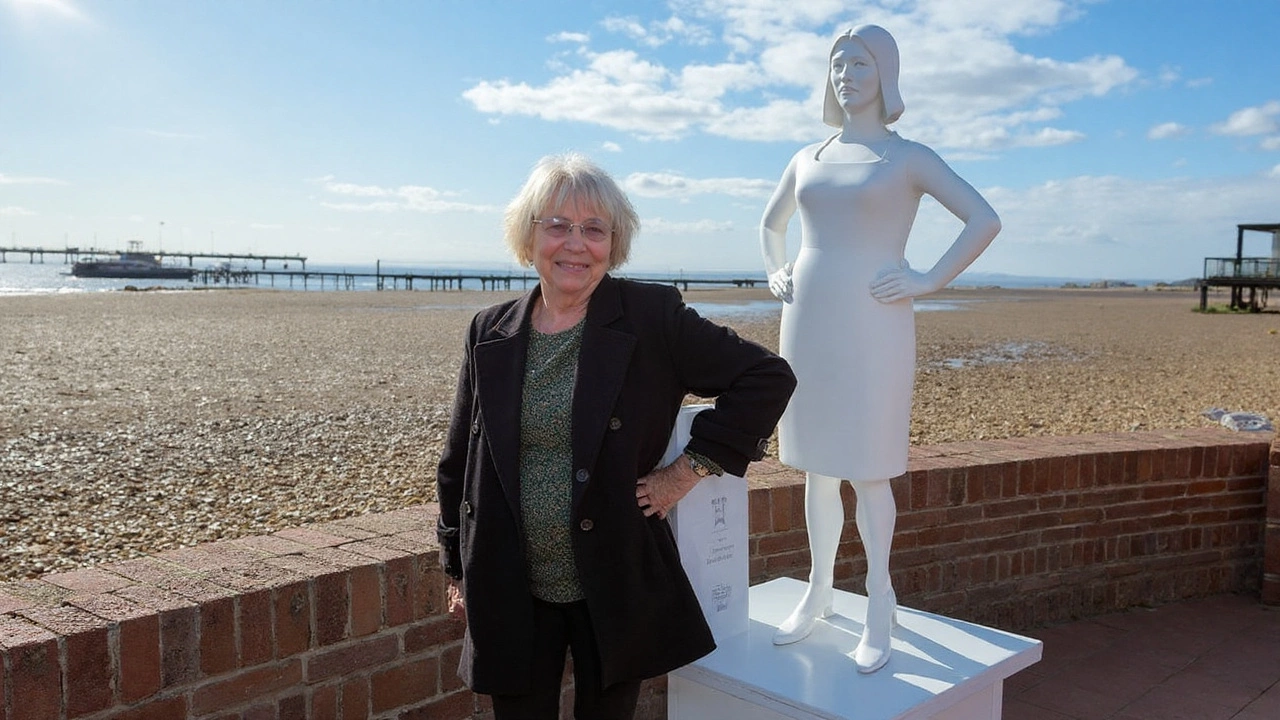When childhood favourites return at 40
Nostalgia can be a brutal test. Bring back characters millions grew up with and the story has to land twice: once for the adults those readers became, and again for the children they once were. That is the stakes game in Jacqueline Wilson’s new adult novel, Think Again, which revisits Ellie, Nadine and Magda — the trio from the 1990s Girls books — as they hit middle age. Published by Bantam at £22, it is Wilson’s first novel for adults in years and, on paper, a bold pivot.
The set-up is clear. Ellie Allard is 40, a single mum, stalking the crowded lanes of modern life: school runs, aging parents, money worries at the margins, and the awkward business of working out who she is now — including her sexuality — after defining herself for so long against other people’s expectations. Nadine and Magda, once the back-and-forth chorus of teenage drama, are here too, reframed by careers, families and the kind of compromises you only really understand in your forties.
Wilson also seems intent on confronting parts of the original series that have dated. Weight, desirability and the pull of bad-boy charm were constant themes in the 90s books, and the new novel nods to today’s conversations around body confidence and consent. Ellie still loves sweet things — almond croissants, Nutella on toast — but she’s no longer defined by her size, and the story makes space for sharper questions about who gets to judge women’s choices, full stop.
There’s also a recurring presence from the past: Mr Windsor, an art-world fixture whose dynamic with Ellie goes back to her teenage years. One of the more unsettling threads is the book’s handling of a man who once loomed large over a 15-year-old now pursuing her as a grown woman. That choice alone sets up a minefield of power and consent, and how the novel addresses it has become a lightning rod for early debate.
Not everyone is convinced by the execution. A prominent UK review argues that much of the dialogue feels almost relentlessly breezy, so airy that the three women sometimes blur into one. Emotion, it says, is often delivered in sighs instead of sentences, which leaves big moments underpowered. For fans used to Wilson’s snap-crackle teen voices, the critique is that adulthood here sounds oddly weightless.
If that reaction stings, it’s because the emotional stakes around the Girls are real. Readers who first met Ellie at 12 or 13 are now in their 30s and 40s. They don’t just want updates; they want recognition. They want fiction that gets the texture of 2020s adulthood — the queasy mix of private and public care work, stalled careers, online noise, and the new rules (and non-rules) of dating — without losing the heart that made these characters matter in the first place.
Wilson knows that pull of the past. The book reportedly winks at the idea, with Ellie admitting she has been stuck living a version of her teenage life. That admission is smart and a little painful, and it opens a door the novel tries to walk through: can a character who was once all impulse and insecurity speak with the grain of adult experience without losing her core?

The hard shift from teen voice to adult interiority
This is the central craft challenge. The original Girls books ran on fizz: crushes, fallouts, sharp one-liners and a pace that matched the rush of adolescence. Adult fiction leans on something else — interiority, contradiction, silence that means something. It’s a gear change that trips up even heavyweight writers. Plenty of children’s authors have crossed over to adult fiction; the ones who do it best usually slow the frame, deepen the contradictions, and let the characters’ choices chafe in uncomfortable ways.
Seen in that light, Think Again sits inside a wider publishing trend: revivals that ask, what happens when the kids grow up? It’s catnip for marketers but treacherous for storytellers. Change too little and you’re accused of stasis; change too much and readers ask where their old friends went. The early criticism here is that the book stays too close to the mood of the 90s, smoothing over the grit that real middle age brings.
There are pieces that will resonate. Ellie’s single motherhood is not treated as a plot device. It shapes her choices, her time, her bandwidth for love and work. The scenes with aging parents also ring true for a sandwich-generation reader — the ones juggling invoices and hospital appointments on the same afternoon. And the effort to bring sexuality into the story like a live wire rather than a label shows Wilson is listening to the present, not embalming the past.
The most controversial material likely sits with Mr Windsor. Power dynamics formed in adolescence do not magically reset at 40. When the book places Ellie across a gallery floor from a man who once towered over her teenage imagination, it is asking the reader to look straight at the grey areas: memory versus agency, influence versus desire. How the novel frames that tension — and whether it interrogates him as much as it observes her — is where many readers will make up their minds.
Style is the other sticking point. Wilson’s great gift in children’s fiction is a voice that never talks down to kids. Transfer that quicksilver patter into adult dialogue without adding the weight of lived experience, and you risk everything sounding the same. That is essentially the complaint from critics so far: too much air, not enough gravity. If the three leads don’t sound distinct — if you can’t feel Magda’s risk appetite separate from Nadine’s steel or Ellie’s tenderness — the book loses the triangulation that made the original friendship work.
There’s also the market reality. A £22 hardback enters a crowded shelf of contemporary adult fiction competing on voice, relevance and edge. Wilson’s name recognition guarantees attention, signings, and a window display. What keeps a book moving after week two is word of mouth about how it made readers feel. With characters this well known, that reaction curve can be steeper than usual — praise is louder, but so is disappointment.
It’s worth saying: revisiting legacy characters is not only a nostalgic exercise. Done well, it can show how time rewires the same people. Think of the way some series let their heroines fail, backtrack, and contradict themselves, embracing the mess of getting older. If Wilson’s bet is that Ellie can carry that mess and still feel like Ellie, the measures of success will be small but telling: pauses that hurt, conversations that don’t resolve, choices that cost.
For readers who grew up with the Girls, the emotional calculus is personal. They want the warmth and the jokes — yes — but also the ballast: decent work gone sideways, friendship that frays under pressure, intimacy that resists neat labels. They want the book to meet them where they live now. That is a tough brief for any writer, even one with Wilson’s storytelling muscle.
None of this erases what Wilson has already done for British reading culture. She changed school libraries. She gave funny, awkward, lovelorn girls a clear first-person channel decades before social media made oversharing a genre. That history is part of why Think Again is such a lightning rod. When a writer has that kind of claim on memory, every new move lands as a referendum.
So where does that leave the verdict? Early critical response is mixed, leaning skeptical on voice and depth, with a particular eye on how the novel handles a legacy power imbalance. But the subject matter — single motherhood, caring for parents, sexual identity, and the unglamorous daily grind — is unmistakably contemporary. Readers will decide whether the tone catches up with the themes.
If you are walking into the book with the Girls still vivid in your head, it might help to adjust expectations. This isn’t a secret fourth book from 1999; it’s a midlife reckoning wearing familiar names. And if the characters sometimes sound more like their younger selves than they should, that may be part of why the debate is so heated. We are, all of us, picky about how our past is written. That’s the quiet price of nostalgia — and the gamble Wilson seems willing to take.
One thing is certain: Jacqueline Wilson has put a question on the table that won’t go away — what does it mean for girls who once taught a generation how to feel to grow up, on the page, beside the people who grew up reading them?





